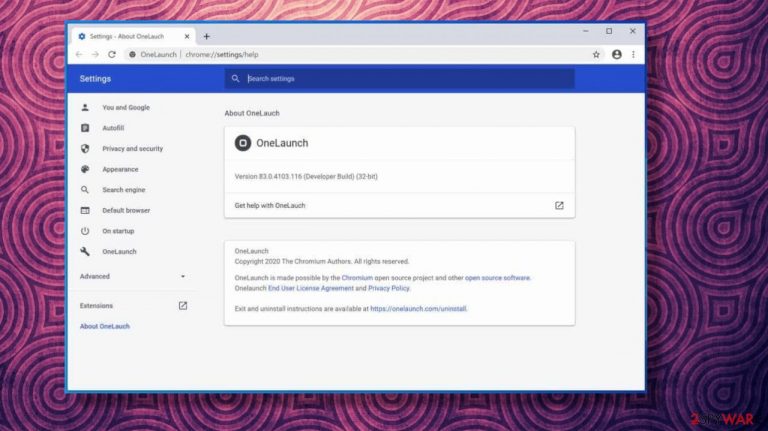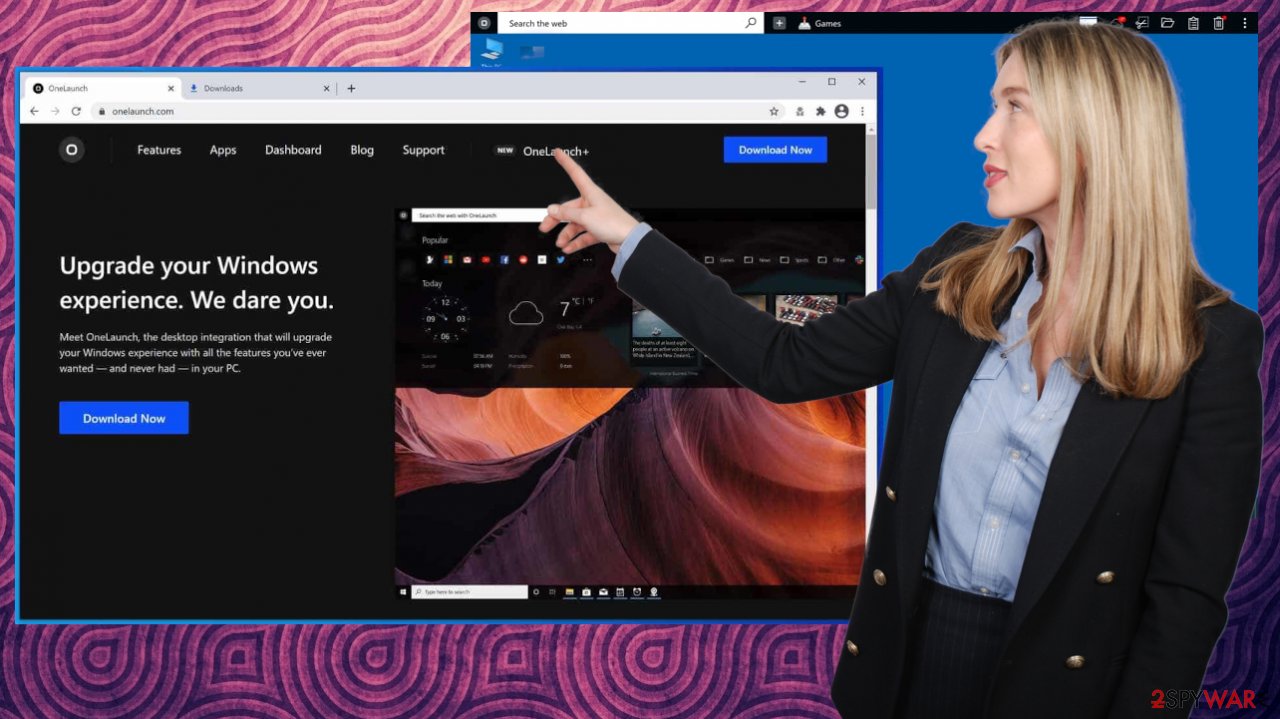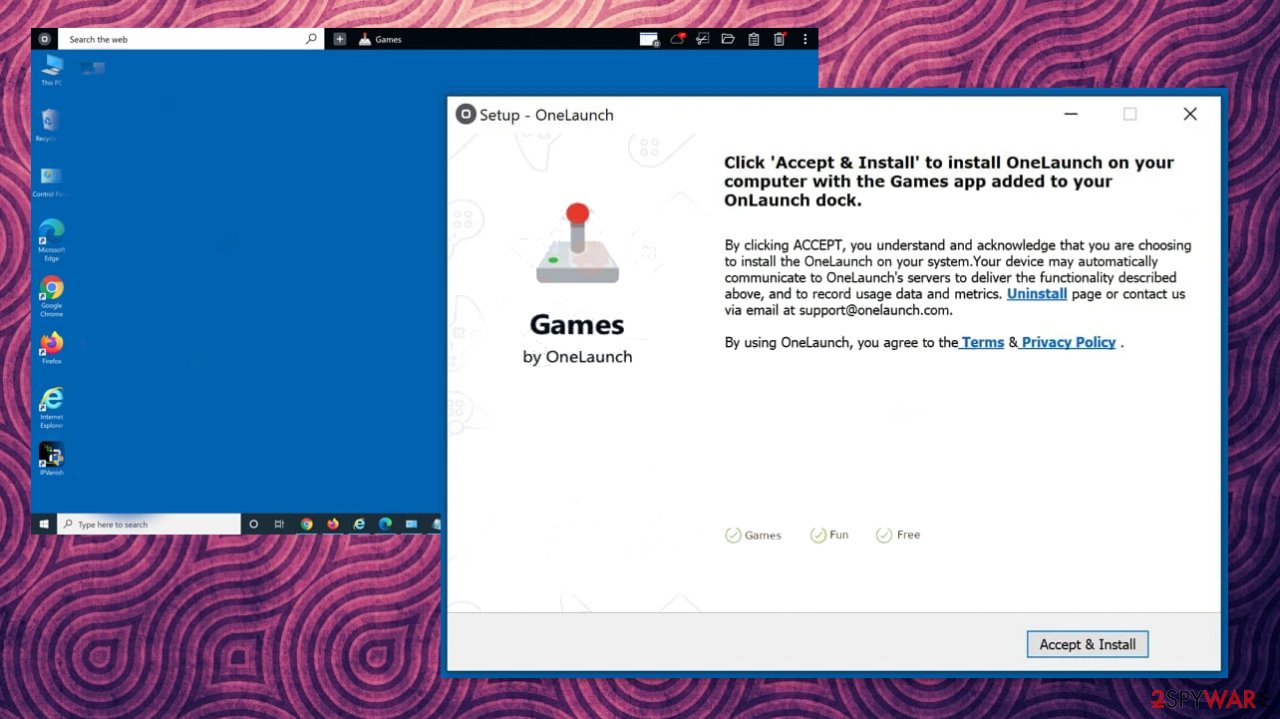OneLaunch (Simple Removal Guide) - Chrome, Firefox, IE, Edge
OneLaunch Removal Guide
What is OneLaunch?
OneLaunch – a Windows application for your everyday tasks

OneLaunch is an application for a Windows computer. According to its developers, the app is developed to make the user experience better by adding an additional bar at the top of the screen. Besides, a customized, Chromium-based browser is also installed which is used for online search activities as a default.
While these features can indeed be useful for users, others might find the app behavior rather intrusive. If that is the case for you, you should follow our guide for the quick removal of all the app's components.
| name | OneLaunch |
|---|---|
| Distribution | Official website |
| Operation | App's icon and a new toolbar docked at the top of the desktop; a customized web browser is used instead of default one |
| Removal | At the bottom of this article, you'll find extensive instructions on how to get rid of this software from the computer |
| further steps | Once you delete the application, you should clean your web browsers. Either follow the instructions below or use FortectIntego to do that automatically |
Features and operation
Once installed, the app creates a startup item that allows it to be launched automatically upon Windows bootup. This function can be changed via the Task Manager > Startup section.
According to the official website, the app provides a variety of features, including an addition of a full dock that is applied at the top of the screen. It would allow users to access certain Windows features much quicker from there, e.g., a built-in snippet tool, file explorer, and browser access. Via the dock, users can also view:
- Weather
- Time
- Location
- Bookmarks
- News.
A search bar at the top of the screen can also be used to quickly access the web. However, while accessing the internet might be faster, it would not be the same routine that most users are used to. This is because the app uses a customized browser that replaces the default one. Unfortunately, this also means that your searchers would be redirected to Yahoo (note that this can be altered to Bing or Google within the Settings menu), which would also sometimes include promotional links at the top.

Since the markings are minuscule, some might not even notice that what they are clicking on is actually an ad – this is a rather unfair practice. In order to stop these redirects to a customized web browser, you would have to stop using the search bar at the top or remove OneLaunch altogether.
Besides, we found some functions to be rather useless. For example, the dock provides access to already active tabs of the browser or other apps. However, you can view it via the taskbar already, which makes the functionality pointless.
Information collection practices
Just like many other programs, OneLaunch collects a certain amount of user data for research and other purposes. It is also important to note that, by installing the program, you agree to terms of service and information gathering practices.
The developers clearly state in the Privacy Policy (which you can view before installing the app) that personal and anonymous information is collected when users use the related website, purchase a software license, or “use the software in any way.” It may include your name, phone number, home address, unique identifier of the PC, credit card details, and more.[1]
This information is stored on appropriate servers, and that will not be used unless it is required, for example, when processing a transaction when a purchase is made.
While the gathering of information is very common, companies usually avoid gathering personal data. Indeed, when a consumer installs software or uses the services of a company, they rely on and trust it to be secure. Considering the number of data breaches, it is best to avoid applications or services that collect an extensive amount of information, especially when it comes to personal details.
In any case, if OneLaunch did not meet your expectations, you can remove it easily. Below we provide several steps on how to do that, so follow the instructions below. Note that security software will not delete this app as it is not recognized as a potentially unwanted program,[2] according to Virus Total.[3]

OneLaunch removal instructions
If you like the application and the functionality it provides, you should keep it installed, as it is completely safe to use. If you are not a fan of altered search preferences changes or data gathering practices, you should proceed with OneLaunch removal.
Below you will find a step-by-step guide on uninstalling the program from Windows via the Control Panel. Also, you might want to clean your web browser data and cookies. Finally, you can contact the app's developers to get the gathered information about you to be deleted.
Note: you do not have to reset your web browsers in this case – cleaning them should be sufficient
You may remove virus damage with a help of FortectIntego. SpyHunter 5Combo Cleaner and Malwarebytes are recommended to detect potentially unwanted programs and viruses with all their files and registry entries that are related to them.
Getting rid of OneLaunch. Follow these steps
Uninstall from Windows
Instructions for Windows 10/8 machines:
- Enter Control Panel into Windows search box and hit Enter or click on the search result.
- Under Programs, select Uninstall a program.

- From the list, find the entry of the suspicious program.
- Right-click on the application and select Uninstall.
- If User Account Control shows up, click Yes.
- Wait till uninstallation process is complete and click OK.

If you are Windows 7/XP user, proceed with the following instructions:
- Click on Windows Start > Control Panel located on the right pane (if you are Windows XP user, click on Add/Remove Programs).
- In Control Panel, select Programs > Uninstall a program.

- Pick the unwanted application by clicking on it once.
- At the top, click Uninstall/Change.
- In the confirmation prompt, pick Yes.
- Click OK once the removal process is finished.
Remove from Microsoft Edge
Delete unwanted extensions from MS Edge:
- Select Menu (three horizontal dots at the top-right of the browser window) and pick Extensions.
- From the list, pick the extension and click on the Gear icon.
- Click on Uninstall at the bottom.

Clear cookies and other browser data:
- Click on the Menu (three horizontal dots at the top-right of the browser window) and select Privacy & security.
- Under Clear browsing data, pick Choose what to clear.
- Select everything (apart from passwords, although you might want to include Media licenses as well, if applicable) and click on Clear.

Restore new tab and homepage settings:
- Click the menu icon and choose Settings.
- Then find On startup section.
- Click Disable if you found any suspicious domain.
Reset MS Edge if the above steps did not work:
- Press on Ctrl + Shift + Esc to open Task Manager.
- Click on More details arrow at the bottom of the window.
- Select Details tab.
- Now scroll down and locate every entry with Microsoft Edge name in it. Right-click on each of them and select End Task to stop MS Edge from running.

If this solution failed to help you, you need to use an advanced Edge reset method. Note that you need to backup your data before proceeding.
- Find the following folder on your computer: C:\\Users\\%username%\\AppData\\Local\\Packages\\Microsoft.MicrosoftEdge_8wekyb3d8bbwe.
- Press Ctrl + A on your keyboard to select all folders.
- Right-click on them and pick Delete

- Now right-click on the Start button and pick Windows PowerShell (Admin).
- When the new window opens, copy and paste the following command, and then press Enter:
Get-AppXPackage -AllUsers -Name Microsoft.MicrosoftEdge | Foreach {Add-AppxPackage -DisableDevelopmentMode -Register “$($_.InstallLocation)\\AppXManifest.xml” -Verbose

Instructions for Chromium-based Edge
Delete extensions from MS Edge (Chromium):
- Open Edge and click select Settings > Extensions.
- Delete unwanted extensions by clicking Remove.

Clear cache and site data:
- Click on Menu and go to Settings.
- Select Privacy, search and services.
- Under Clear browsing data, pick Choose what to clear.
- Under Time range, pick All time.
- Select Clear now.

Reset Chromium-based MS Edge:
- Click on Menu and select Settings.
- On the left side, pick Reset settings.
- Select Restore settings to their default values.
- Confirm with Reset.

Remove from Mozilla Firefox (FF)
Remove dangerous extensions:
- Open Mozilla Firefox browser and click on the Menu (three horizontal lines at the top-right of the window).
- Select Add-ons.
- In here, select unwanted plugin and click Remove.

Reset the homepage:
- Click three horizontal lines at the top right corner to open the menu.
- Choose Options.
- Under Home options, enter your preferred site that will open every time you newly open the Mozilla Firefox.
Clear cookies and site data:
- Click Menu and pick Settings.
- Go to Privacy & Security section.
- Scroll down to locate Cookies and Site Data.
- Click on Clear Data…
- Select Cookies and Site Data, as well as Cached Web Content and press Clear.

Reset Mozilla Firefox
If clearing the browser as explained above did not help, reset Mozilla Firefox:
- Open Mozilla Firefox browser and click the Menu.
- Go to Help and then choose Troubleshooting Information.

- Under Give Firefox a tune up section, click on Refresh Firefox…
- Once the pop-up shows up, confirm the action by pressing on Refresh Firefox.

Remove from Google Chrome
Delete malicious extensions from Google Chrome:
- Open Google Chrome, click on the Menu (three vertical dots at the top-right corner) and select More tools > Extensions.
- In the newly opened window, you will see all the installed extensions. Uninstall all the suspicious plugins that might be related to the unwanted program by clicking Remove.

Clear cache and web data from Chrome:
- Click on Menu and pick Settings.
- Under Privacy and security, select Clear browsing data.
- Select Browsing history, Cookies and other site data, as well as Cached images and files.
- Click Clear data.

Change your homepage:
- Click menu and choose Settings.
- Look for a suspicious site in the On startup section.
- Click on Open a specific or set of pages and click on three dots to find the Remove option.
Reset Google Chrome:
If the previous methods did not help you, reset Google Chrome to eliminate all the unwanted components:
- Click on Menu and select Settings.
- In the Settings, scroll down and click Advanced.
- Scroll down and locate Reset and clean up section.
- Now click Restore settings to their original defaults.
- Confirm with Reset settings.

Delete from Safari
Remove unwanted extensions from Safari:
- Click Safari > Preferences…
- In the new window, pick Extensions.
- Select the unwanted extension and select Uninstall.

Clear cookies and other website data from Safari:
- Click Safari > Clear History…
- From the drop-down menu under Clear, pick all history.
- Confirm with Clear History.

Reset Safari if the above-mentioned steps did not help you:
- Click Safari > Preferences…
- Go to Advanced tab.
- Tick the Show Develop menu in menu bar.
- From the menu bar, click Develop, and then select Empty Caches.

After uninstalling this potentially unwanted program (PUP) and fixing each of your web browsers, we recommend you to scan your PC system with a reputable anti-spyware. This will help you to get rid of OneLaunch registry traces and will also identify related parasites or possible malware infections on your computer. For that you can use our top-rated malware remover: FortectIntego, SpyHunter 5Combo Cleaner or Malwarebytes.
How to prevent from getting system tools
Stream videos without limitations, no matter where you are
There are multiple parties that could find out almost anything about you by checking your online activity. While this is highly unlikely, advertisers and tech companies are constantly tracking you online. The first step to privacy should be a secure browser that focuses on tracker reduction to a minimum.
Even if you employ a secure browser, you will not be able to access websites that are restricted due to local government laws or other reasons. In other words, you may not be able to stream Disney+ or US-based Netflix in some countries. To bypass these restrictions, you can employ a powerful Private Internet Access VPN, which provides dedicated servers for torrenting and streaming, not slowing you down in the process.
Data backups are important – recover your lost files
Ransomware is one of the biggest threats to personal data. Once it is executed on a machine, it launches a sophisticated encryption algorithm that locks all your files, although it does not destroy them. The most common misconception is that anti-malware software can return files to their previous states. This is not true, however, and data remains locked after the malicious payload is deleted.
While regular data backups are the only secure method to recover your files after a ransomware attack, tools such as Data Recovery Pro can also be effective and restore at least some of your lost data.
- ^ Privacy Policy. OneLaunch. Official website.
- ^ Potentially Unwanted Application. Trend Micro. Security blog.
- ^ Fun Games by OneLaunch Setup_cp7t.exe. Virus Total. File and URL analysis.
